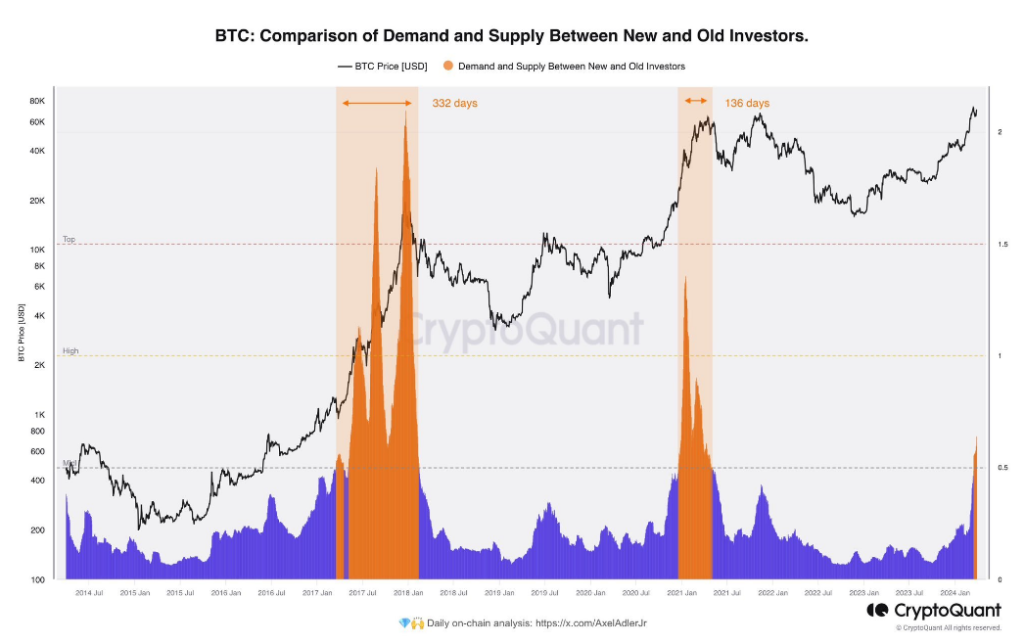ARTICLE AD
Bitcoin (BTC) is poised for a potential surge after forming a bullish technical pattern and attracting a wave of institutional investment. The world’s leading cryptocurrency recently surpassed the $70,000 mark, setting the stage for a possible breakout that could eclipse its current all-time high of $73,750.
This optimistic outlook comes from analyst Ali Martinez, who identified a bull flag pattern on Bitcoin’s 4-hour chart. This technical indicator typically follows a significant price increase and signifies a consolidation period with a slight downward trend. However, the decreasing trading volume during this phase suggests a temporary pause rather than a reversal, potentially leading to a renewed uptrend.
Validating The Bull Flag Pattern: Bitcoin Consolidation Phase Analysis
Bitcoin’s recent dip below $61,000 served as a testing ground for this theory. The cryptocurrency demonstrated resilience by rebounding into the $67,000-$70,000 range, solidifying the potential validity of the bull flag pattern. This consolidation phase is crucial for market participants to reassess their positions and gauge overall investor sentiment.
#Bitcoin appears to be breaking out of a bull flag on the 4-hour chart! If $BTC holds above $70,000, we could see a surge of nearly 10% to a new all-time high of $77,000! pic.twitter.com/MPVB70p9DU
— Ali (@ali_charts) March 28, 2024
The recent dip wasn’t necessarily a cause for alarm, explained Martinez. In fact, it could be interpreted as a healthy consolidation that strengthens the foundation for further growth.
Beyond technical analysis, a significant shift in Bitcoin’s ownership structure is fueling optimism. The long-awaited launch of spot Bitcoin Exchange Traded Funds (ETFs) in the United States has opened the door for institutional investors. These professionally managed funds, backed by major financial institutions, are estimated to hold a combined 5% of the total Bitcoin supply.
On-chain data further corroborates this institutional influx. CryptoQuant, a blockchain analytics firm, reports a deviation from past bull cycles. Traditionally, Bitcoin ownership flowed from existing large holders (“whales”) to retail investors. However, the current market cycle appears to be witnessing a transfer from these whales to new whales – traditional financial institutions.

Bitcoin’s Bullish Price Predictions
The influx of institutional capital has emboldened some analysts to make bullish price predictions. While Martinez refrained from offering a specific timeframe for the anticipated breakout above $73,750, others are more forthcoming. Optimistic forecasts range from $100,000 to $150,000 for Bitcoin by the end of 2024, with some even predicting a staggering price of $500,000 by 2025.
Related Reading: Fantom: Market Slowdown Chops Off 10% From Gains – Here’s Why
However, experts caution against blindly following such extreme predictions. The cryptocurrency market remains inherently volatile, and technical analysis is not a foolproof method for guaranteeing future price movements. The long-term impact of institutional involvement on market dynamics is also yet to be fully understood.
Despite these words of caution, the confluence of a bullish technical pattern and a surge in institutional investment has undeniably created a sense of excitement surrounding Bitcoin. As the world’s leading cryptocurrency continues its ascent towards uncharted territory, all eyes are on whether it can indeed break new ground and establish a new all-time high.
Featured image from Pexels, chart from TradingView
Disclaimer: The article is provided for educational purposes only. It does not represent the opinions of NewsBTC on whether to buy, sell or hold any investments and naturally investing carries risks. You are advised to conduct your own research before making any investment decisions. Use information provided on this website entirely at your own risk.

 9 months ago
55
9 months ago
55 

